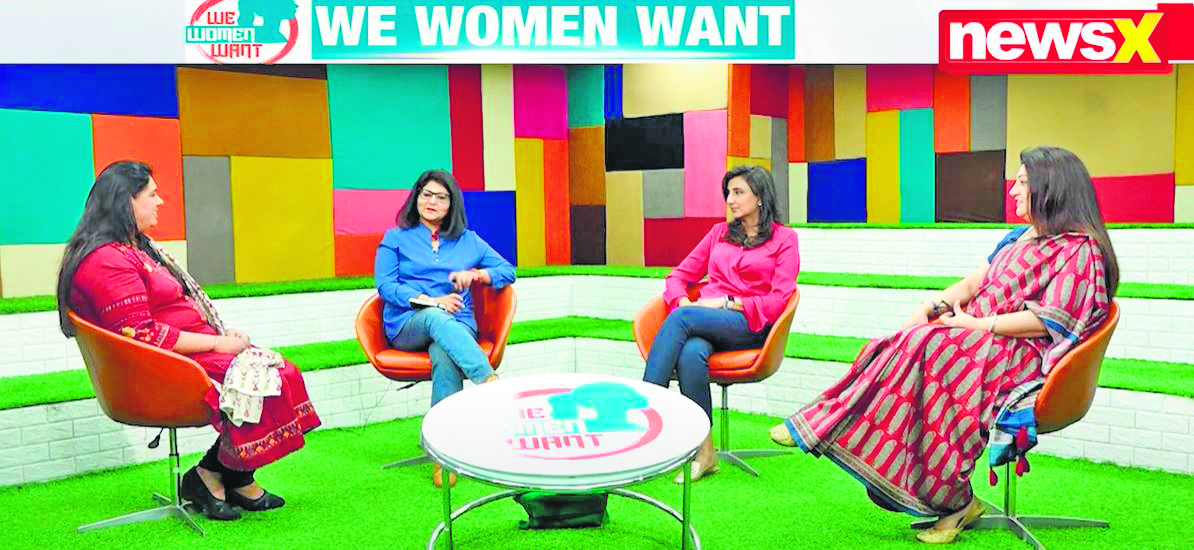
“We Women Want,” our weekly show where we delve into women’s issues, celebrate achievements, and provide support for those in need. Feel free to share your topics for discussion. Today, we’re exploring the evolving dynamics of relationships and marriages, with changing values and women’s increasing financial independence challenging traditional norms. Joining me are our esteemed panelists: Dr Harshali Singh an author of the ‘Haveli’ series. Nomita Kohli Principal & designer at interior designer and Dr. Vimal, a psychologist.
Excerpts
Q. Dr. Vimal, as a psychologist counseling many couples, do you observe a changing nature of relationships due to evolving expectations? What are couples, especially women, looking for in relationships now?
A. Yes, there’s a definite shift. Values are changing, and the world has become smaller. People are looking beyond their immediate surroundings and using websites to actively participate in finding a partner. Education, wealth, and the desire for a secure future are common criteria. Personalities and individual preferences are also gaining importance.
Q. Nomita, you mentioned a proactive shift in girls actively seeking relationships on platforms like Bumble. How do you see this impacting the dynamics of relationships?
A. It’s a significant change. Girls are now proactively exploring relationships on dating apps, not just for marriage but for companionship. They are questioning the traditional “fair and lovely” narrative and are more interested in understanding the person they are considering for a relationship.
Q. Dr Harshali as someone observing societal shifts, what’s your perspective on the changes in partner preferences and the active role girls are taking in the process?
A. Education and exposure have played crucial roles. The emphasis is now on personal compatibility, beyond just family background. Matrimonial websites reflect changing priorities, where attractiveness and financial stability often precede family considerations.
Q. Dr Vimal with this evolving landscape, do you see a reversal in traditional roles? Are women actively taking the lead in decision-making in relationships?
A. Absolutely, the decision-maker is increasingly the girl herself. The trend is shifting from the traditional family-driven approach to a more individualized decision-making process. Education and exposure empower individuals to make informed choices about their partners.
Q. You mentioned the trend of both partners working and keeping finances separate. How does this impact the dynamics of relationships, especially when it comes to financial decisions?
A. There’s a strong emphasis on both partners working for better socio-economic standing. The “your money, my money, our money” approach is common, especially when it comes to shared expenses like travel, children, and even pets. Interestingly, pets are sometimes considered as a replacement for having children.
Q. Nomita, you talked about the changing role of in-laws. How are in-laws perceived in modern relationships, and has their role diminished?
A. The perception of in-laws has evolved. While there’s acknowledgment of family customs and traditions, the decision-making in a marriage is now primarily between the two individuals involved. Families, whether on the girl or boy’s side, play a supportive rather than directive role.
Q. Nomita, do you think the changes in living arrangements, with couples preferring privacy, contributes to better relationships?
A.Absolutely, providing privacy and space, even in two-tier cities, is becoming more common. Parents understand the importance of giving the newly married couple their own space, which can contribute to better understanding and harmony.
Q. With the ongoing churn and transition in relationship dynamics, do you think uncertainty and the search for the best way to navigate these changes contribute to more marriages breaking up?
A. There is indeed a churn and a transition phase. Uncertainty can lead to challenges, but it’s also an exploration of what works best. Some marriages may face difficulties, but others find innovative ways to navigate the changing landscape. It’s a learning process for everyone involved.